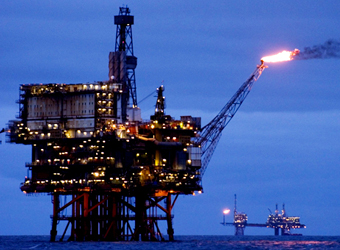Analysts are warning that militants could wreak havoc soon on Nigeria’s oil industry, plunging the African petrostate back into a cycle of sabotage.
Nigeria, Africa’s largest oil producer, has seen a period of relative calm in its restive southern delta region over the last year. Early in 2016, a series of spectacular attacks carried out by a mysterious group called the Niger Delta Avengers cratered Nigeria’s oil production, exacerbating an economic crunch triggered by low oil prices.
Nigeria’s oil output has rebounded to 1.8 million barrels a day more quickly than anticipated this year. That has frustrated OPEC’s efforts to drain a global crude glut through coordinated output cuts. A reversal would likely put upward pressure on oil prices.
“Militant groups are running out of patience, the government is unable to deliver on its promises, the president is a ‘lame duck’, and the umbrella group negotiating on behalf of the militants shows signs of disintegration,” Malte Liewerscheidt , senior analyst at Verisk Maplecroft wrote in a briefing this month.
“All of this suggests that the current period of ostensible tranquility in the oil-producing Niger Delta could be over soon as the country heads towards elections in 2019,” he said.
Attacks by the Niger Delta Avengers, who want the south to get more of the nation’s energy revenue, caused billions in lost revenue and sidelined hundreds of thousands of barrels per day of output. The Avengers appear to be cooperating with a group of Niger Delta leaders engaged in talks with the federal government, but several other militant groups have signaled they’ve run out of patience with negotiations.
A group called the Niger Delta Revolutionary Crusaders vowed in July to resume attacks at the end of September, and various other militants have made similar threats. The same day, the Pan Niger Delta Forum said it would pull out of talks if the government did not address its list of 16 demands by November.
Manji Cheto, a political risk analyst at Teneo Intelligence, said these developments reaffirm her view that the peace deal was always temporary at best. There are too many militant groups with competing interests, and many of PANDEF’s demands are too ambitious to achieve in the short term, she said.
“It’s rather hopeful to say peace in the Niger Delta will hold,” she told CNBC.
The odds of attacks resuming by year end are low, perhaps 30 percent, according to Cheto. But the chances will ramp up next year to about 60 percent as campaigning begins for Nigeria’s February, 2019 presidential elections. A major factor will be whether southerners perceive that Vice President Yemi Osinbajo, who has spearheaded negotiations, is being sidelined, she added.
Eurasia Group, a risk consultancy, takes a more sanguine view. It believes President Muhammadu Buhari’s government will strive to keep the peace during the campaign year. The firm notes that Buhari has increased payments to former militants through an amnesty program and awarded new security contracts to militant-linked firms.
New groups will likely carry out attacks in the hopes of securing similar payouts, Eurasia Group says, but it’s uncertain if they can carry out sophisticated attacks similar to strikes by the Niger Delta Avengers and MEND, a group that waged a three-year campaign in the south.
“While not our base case, it is possible that one such group could acquire the resources to pull off a major attack that significantly disrupts oil production. But, even in that scenario, the administration will likely respond promptly with diplomatic overtures, reducing any further impact on production volumes,” Eurasia Group’s senior Africa analyst Amaka Anku wrote in a research note this month.
An outbreak of violence would add to a growing number of risks in OPEC nations. Those include $3.5 billion in debt payments coming due for Venezuela’s beleaguered state oil giant, threats by President Donald Trump to reimpose sanctions on Iran’s energy industry and a growing dispute in Iraq between the central government and the crude-producing Kurdish region.
Source: CNBC



